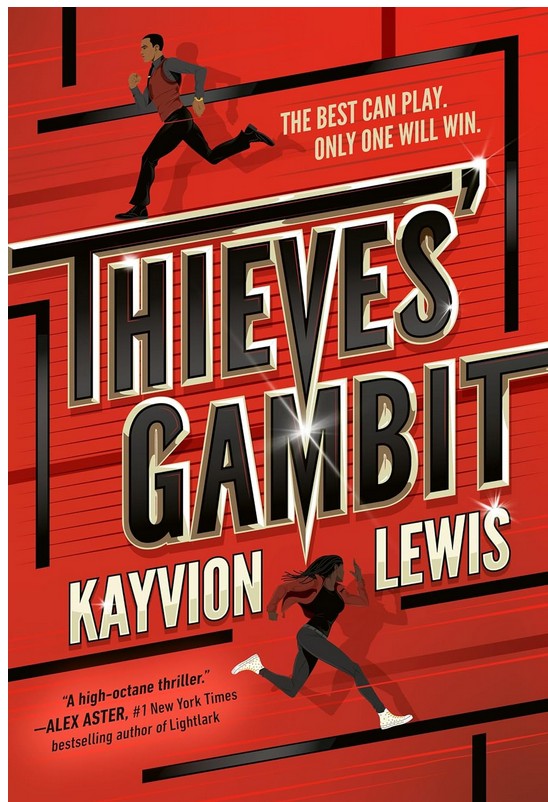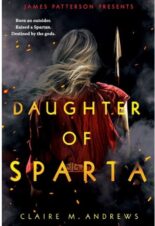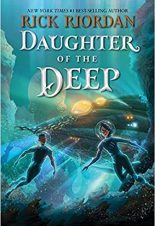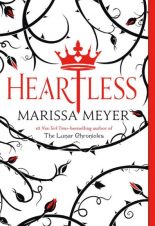
Buy This Book
Other books by Claire M. Andrews
“The gods will chain you up in their secrets and tricks if they can,” Ligeia said. “Apollo would upend the world for you, Daphne, and the gods will not take kindly to that.” –Blood of Troy
Blood of Troy
Daughter of Sparta #2
by Claire M. Andrews
LGBTQ, Strong Female
14+
Score
6.3
496
A year after saving the powers of Olympus by defeating Nyx, the Goddess of Darkness, Daphne is haunted by still-looming threats, her complicated feelings for the god Apollo, and the promise she made to the Olympian gods that she would help them again when they called upon her. When their command finally comes, it is deceptively simple: secure herself a spot as one of Queen Helen’s guards.
A war is coming, and all of Sparta must be prepared.
In the midst of a treaty summit among the monarchs of Greece, Daphne and Helen uncover a plot of betrayal—and soon, a battle begins that leads to an all-out war. As the kingdoms of Greece clash on the shores of Troy and the gods choose sides, Daphne must use her wits, her training, and her precarious relationship with Apollo to find a way to keep her queen safe, stop the war, and uncover the true reason the gods led her to Troy. But the gods are keeping more than one secret, and Daphne will be forced to decide how far she is willing to go to save those she loves—and whose side she’s on in a war that is prophesied to be the downfall of her people.
Blood of Troy continues to follow Daphne as she tries to fulfill the gods’ command to protect Zues’ daughter, Helen. While Daphne’s motives are honorable, she doesn’t consider how her actions affect others, including her own family and friends. In addition, some of Daphne’s decisions don’t make sense. For example, even though Hermes has betrayed the gods and her, Daphne trusts him. On the other hand, Daphne pushes Apollo away despite his love and desire to help protect her. Ultimately, Daphne follows her heart, but that only leads to destruction.
The book begins with a recap of the bloody battle between Daphne and Nyx that appeared in Daughter of Sparta. Many of the characters from Daughter of Sparta reappear in the second installment, giving readers a broader view of each character’s motivations. However, the gods are experts at manipulating people, and several times, the gods take over someone’s body. This adds some confusion to the story, and readers must pay close attention to the details.
Readers unfamiliar with Greek mythology will have difficulty understanding the events in Blood of Troy. Still, those familiar with The Odyssey and the Trojan War will enjoy seeing a new interpretation of the myths. However, the detailed and gory battle scenes make the book best suited for mature readers who do not get squeamish.
Daphne is admirable because she is willing to fight and die to protect Queen Helen. However, Daphne only trusts herself to make wise decisions even though she is surrounded by many others who are brave and knowledgeable, such as the Amazons, Apollo, and the Trojan royalty. However, this doesn’t detract from the tragic conclusion or the surprising answer to Daphne’s parentage. Blood of Troy is a fast-paced book that weaves an exciting story and brings Greek mythology to life in a new way. Enjoy more books that reimagine mythology and bring new life to ancient myths by reading Medusa by Jessie Burton and the Starcrossed Trilogy by Josephine Angelini.
Sexual Content
- Apollo approaches Daphne while she’s alone in a garden. While they talk, “an overwhelming urge sweeps over [Daphne] to pull him close and brush [her] lips against his neck.” When Daphne rejects Apollo’s advances, he wonders, “Why do you not give in to the fire between us?”
- Apollo tells Daphne he will answer one of her questions if she kisses him. “One question for one, single kiss. Hunger pools in my core like liquid fire. The fire of my fury fights for dominance in my mind. . .” Daphne’s brother interrupts them.
- After winning a tournament, Daphne’s brother insinuates that she didn’t win honestly. Daphne says, “You truly believe that I would barter my own body to win that tournament?”
- One of the Greek kings believes a woman’s “place is in the bedchamber, and the bedchamber alone.”
- When Daphne refuses to leave Queen Helen’s side, her husband says, “Will you stand behind the bed as I fuck her as well?”
- During a play, Ares “buries his face in [Aphrodite’s] chest. . . The noises of their fake lovemaking grow more obnoxious by the second. The catcalls and whistles in the audience swell.”
- After sparring, Daphne returns to her room to find a naked Apollo in the bath. “In my mind, I don’t bother ripping off my sweat- and sand-stained clothes. I leap into the bath fully clothed and smother the god with kisses.” When Apollo gets out, “the silk sheet pulls taunt across his wet skin. . .” Apollo disappears when someone enters the room.
- An Amazon tells Daphne, “I’ve lost two lovers to battle. Both were vibrant and ferocious [women].”
- Daphne overhears an Achaean soldier saying, “All the lovely ladies are being hoarded by the king. But we could fuck the rats that seem to infest this place if we were truly desperate.”
- Daphne sees her brother, who has two lovers. “The warrior king’s profile is hungry as he looks over my brother and his lover. Their lover. Heat flames my cheeks as the Myrmidon swoops down to sit between them. His perfect lips capture my brother’s with expert ease before next claiming Patroclus’s.”
- While alone with Daphne, Apollo “looks me over, gaze lingering on my lips, the arch of my neck, between my breasts and thighs. I imagine his lips in all those places. . . His face dips, lips brushing my own. . . I want to kiss him. But once you’ve tasted that heavenly fire, can you really be content with anything less?” Daphne pushes him away.
- Odysseus questions Queen Helen. She asks him, “What animals do they claim I make love to?” Odysseus replies, “The human variety, I assure you.”
- After the Achaeans forfeit and prepare to go home, Daphne and Apollo kiss. “His touch is searing, his lips piercing. My hands explore his chest, his hips and he pulls me down to the bed. . . [Apollo’s hands] travel every inch of me. Filling me with an insatiable heat and longing. . . I pull the ties of my chiton and let it fall around us. He grips my thighs, eyelids heavy with hunger. . . I lean down, claiming his lips again.” The scene implies that they have sex and is described over a page.
Violence
- Since Blood of Troy contains excessive and gory violence between humans, gods, goddesses, and mythological creatures, not all violence is described below.
- Queen Helen and Daphne sneak away from the guards. As punishment, Helen’s husband, Menelaus, orders Daphne to be whipped. Daphne is “flattened against a well. The guards take each of my wrists and smash them above my head. . . they shred the fabric along my spine. . . [the whip’s] sting is belated, like an afterthought. Then it begins to burn, a line of fire across my spine. . .It cuts through the air and slices my back. . . [Menelaus’s] lash is the worst. It stretches across my shoulder and catches in my hair.” Daphne is whipped six times.
- Sometimes, Daphne reflects on the violence inflicted upon her in the last book. For example, Daphne killed Minos. “If I close my eyes, I can still remember the sound of Minos’s death. The squelch of blood and bone.”
- While fleeing Sparta, Daphne is hit with an arrow. “A dull pain ricochets up my spine. A yelp escapes me, and I double over. . .” Daphne is injured, and Apollo heals her wound.
- Ares and Apollo fight. While the fight is not described, Apollo is injured. “There’s a dark bruise on his sharp jawline, and a gash that slices his left eyebrow in half. His palms are sticky with black blood. . .”
- When Daphne doesn’t protect Helen to Zues’ liking, he punishes her. “Pain, like none I have ever known, shoots through me. I scream and crumple to my knees. My back arches as lash after lash of lightning hits me. . . I scream again, the cry tearing my throat apart. . . My chest heaves, but no air will come in. Each breath sends a spasm throughout my entire body.” Apollo helps relieve Daphne’s pain.
- While Daphne and her companions are outside Troy’s gates, the Furies attack. “A woman cries for help as they grab each of her arms. And then rip her in half. The woman’s blood rains down upon the city. . . A yell shreds the air and a warm wetness rains down upon us. . . [The Furies] plucking Trojans from other streets and ripping them in half above us.”
- The Furies fight against Troy. During a battle, their “[f]angs dripping with blood. Their wings pump the air. . . Rain begins to pour, mingling with the blood on [Daphne’s] skin and running in rivulets down [her] face.”
- During a battle, the Achaean army shoots arrows at those fighting for Troy. “Drums and horns echo around us, mixing with the screams of the dying. The stench of smoke and blood coats my throat. . . I ram my sword into the next man’s gut and shove him aside. . . A spearhead dives straight for my face. I spin, sword flashing. It lodges into the arm of a man, and his scream rattles my eardrum.”
- During the battle, Daphne fights a man. She “jerks the dory from his startled grip. I sweep his feet from beneath him, and with a wild scream, I ram the point through metal, leather, and bone. Right into the center of his chest. He chokes on blood, spraying my face. . .” There are many blood deaths. The fight is described in several chapters.
- A Spartan attacks Daphne. “His spear catches me in the ribs, tearing through leather and flesh. [Her spear] slicing the man right across the throat. . .” Artemis and Hera join the battle and save Daphne.
- Daphne and her friends free women whom the Spartans captured. “The women whimper and huddle together, even when the chain between them goes slack. . . these women forced to lay in their own filth. Bruises dot their arms and legs, many sporting blackened eyes and broken lips.”
- During a battle, Daphne fights the enemy. “A dory swings for me. I duck and its tip slices my cheek. A searing pain rushes through my face. I deflect the next swing, spinning within the man’s reach. Surprise widens his mouth as my sword plunges into his gut.”
- During the battle, Ares hits Daphne with a club. “I moan, cradling my ribs as little jolts of lightning tear up my side. . . I collapse. . . His club cracks into my spine. . . his blow reverberates throughout my whole body.” Penthesilea, the Amazon’s queen, rescues Daphne. “Penthesilea drives a dagger right into his back. His eyes pop open. . . Her lovely face is pained with enemy blood.”
- While helping Daphne, someone stabs Penthesilea. “A dagger’s point glints from the center of her chest, stealing her final words. . . She gasps. . . Blood soaks through her leather breastplate.” It is later revealed that Penthesilea’s father killed her.
- During a battle, Hector and Achilles duel. “The Adamantine sword drives right through the shield and plunges into Hector’s chest. With a roar. . . Achilles lifts both the shield and Hector’s twitching body and flings them aside.”
- Under the control of a god, Daphne’s brother attacks her. He punches Daphne, and “then the air blows out of me in a great rush. I stumble, slipping on the warm liquid that now coats my feet. . . barely raise the dagger in time. It rams into his stomach. . . blood coats my hands, warm and sticky.” Daphne’s brother dies.
Drugs and Alcohol
- At a party celebrating Daphne’s success, “the ever-flowing wine is bountiful.”
- The Greek kings travel to Sparta for a trade summit where “wine is kicked back eagerly.” One evening, “Theseus cracks his cup against Agamemnon’s, making the great kings both roar with laughter as wine spills over his feet.”
- Daphne goes into the banquet hall where men sleep after “Dionysus slipped a little drop of Lethe into the cups being served.” Lethe, water from one of the many rivers of the underworld, makes men forget.
- Many people, including the gods, drink wine. For example, “Hermes snatches up the jug of wine once more and takes a swig.”
Language
- Profanity is used occasionally. Profanity includes ass, assholes, bastard, bitch, damn, fuck, gods-damn, and whore.
- “Oh Gods” is used as an exclamation several times.
Supernatural
- To cause dissent, Ares, the God of War, takes the form of King Theseus (the hero who killed the minotaur).
- While in Sparta, the kings argue. Daphne asks the Olympians to erase the kings’ memories. Aphrodite says, “We cannot wipe the memories from a hundred people at once. We are powerful, but nothing like that.”
- When Apollo refuses to leave Daphne, Zeus binds Apollo’s power. “. . .He crumples. The muscles in his shoulders and arms twitch, skin pulling taut. His head flings back, eyes and mouth clenched. . .” Apollo loses most of his powers and becomes “the weakest God of Olympus.”
- Artemis cursed Daphne with the Midas Curse. However, the curse saves her life. While being attacked, “The gold curse encases my hand like a glove just as the sword cleaves between my fingers. It bounces off my palm.”
- While making the Trojan Wall, Apollo used his blood. “It is magicked to keep those who wish Troy ill from breaching the city unless invited in.”
- Kassandra, the princess of Troy, tells prophecies, but some people believe she is crazy. After one prophecy, Daphne thinks, “Kassandra is mad, but where once I assumed her ramblings thoughtless and deluded, now a quiet panic overtakes me as the truth of her words sings.”
Spiritual Content
- The story occurs in Sparta during King Menelaus’ and Queen Helen’s rule. The Greek gods play a prominent role in the story and intervene in human affairs. Below are some examples of how the gods play a role in the story.
- The Fates appear to Daphne. When the oldest Fate touches her, “the ground is swept from beneath me. . . I am now pulled slowly, floating on a tide until my feet find steady ground. I stand in a field of blood, corpses stretching for miles and miles . . . The bodies are burdened by armor from all corners of Greece.” The Fates warn Daphne that Greece will erupt in war and Sparta “will be gone forever more on the bloody fields of Troy.”
- Daphne’s adoptive father warned her not to trust the gods with a living tattoo. Daphne sees “a moving tattoo—like the roosters and snakes on Hermes, and the vulture emblazoned across Ares’s chest—is drawn across my father’s back. A map, but not of mountains, cities, or temples. Blue lines, undulating and twisting, reaching from his shoulders to the back of his thighs. Rivers, streams, and lakes.”
- Daphne is sent to Olympia, where the gods discuss the upcoming war between Sparta and Troy. “Hephaestus pounds a great hammer into an anvil above the hearth. . .Around him, Gods balance weapons and argue. Athena and Hera are in each other’s faces; both dressed in shimmering battle leathers. . . Poseidon, with his fist on his hips, towers over the working Hephaestus.” All of the Olympian gods are present.
- During the Trojan War, the Greeks “ransacked the Temple of Artemis. . . Poseidon has brought unseasonable dangerous storms to the Aegean in retribution.”
- The Furies play a part in the Trojan War. They have wings and fangs. “Their faces are a mixture of horrifying and lovely in equal measure, smooth skin marred with a deadly pale and red paint blazing from their eyelids. They carry barbed swords, and around each of their necks is a viper tattoo that incessantly coils.”
- The Olympians were given tattoos from Acat, a deity in Mayan mythology, who associated with tattooing and was revered by Mayan tattoo artists and scribes.
- The gods take sides in the Trojan War. Athena’s owl tells Daphne, “You already know that Nyx has swayed the Achaeans to fight for her. . . She is aided by Erinyes and Ares, and the goddess Eris and Enyo. . .” Throughout the war, other gods jump to help their side win.
- Daphne discovers that her father was one of the Titans, Oceanus. He was the god and personification of the freshwater river Oceanus. Unknowingly, Daphne sets the Titans free, and they destroy Troy and kill most of the people.
Other books by Claire M. Andrews
“The gods will chain you up in their secrets and tricks if they can,” Ligeia said. “Apollo would upend the world for you, Daphne, and the gods will not take kindly to that.” –Blood of Troy
Latest Reviews

Aaron Judge

The Broken Bees’ Nest

The Urban Owls

Where Have All the Bees Gone?

Away

Gamer

Rick Kotani’s 400 Million Dollar Summer

Pride: A Pride & Prejudice Remix

Thieves’ Gambit #1







